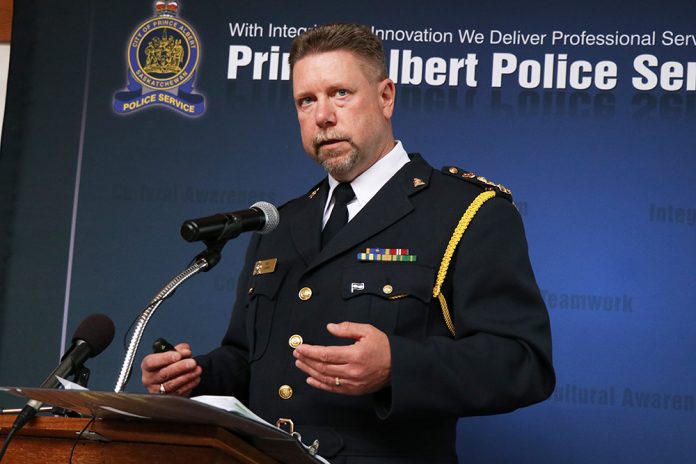Police Chief Troy Cooper has gone from doubtful to critical on Ottawa’s marijuana plan, rejecting some key parts of the legislation and saying he’s “nervous” about next summer’s legalization deadline.
Cooper has long seemed hesitant over marijuana legalization. Thursday, the day of his speech to the Chamber of Commerce, was perhaps his clearest expression of frustration over the pace of the federal plan – which foresees legal weed by July 2018.
“We’ve asked, as a police service, please give us more time,” he told the audience of local business leaders gathered at the Wildlife Federation building.
He said he’s worried about whether the plan will protect children, especially in light of provisions that would make it legal for minors to possess the drug – though selling to them will be severely punished. He’s also not convinced that legalization will exclude organized crime groups from participating in the trade.
“We believe that we haven’t had enough time to ensure that they stay out of the marijuana game,” he said.
But most of his concerns centred on the police service’s ability to catch drugged drivers.
“We have no equipment to test for impaired driving. We have no training about impaired drivers,” he said. “In order to get the training that’s necessary, the expensive, expensive training, we need to send an officer to Florida.”
That, he said, suggests “something’s broken.”
The chief said police are opposing provisions in Ottawa’s plan that would allow people to grow their own marijuana plants. He said home cultivation will make it more difficult to regulate the market and could “provide easy access to children.”
Mayor Greg Dionne said he agreed wholeheartedly with Cooper’s concerns. He nodded forcefully when the chief criticized legalization of possession for minors.
“I just oppose that 100 per cent,” the mayor told the Daily Herald. “We are going to let a kid smoke a joint and not have a drink? Where are your morals.”
Dionne rejected the idea that minors should be criminally charged for possessing marijuana, however. He said police should confiscate their drugs, impose a fine and notify their parents.
That doesn’t appear inconsistent with the federal plan, which would simply eliminate criminal sanctions for young people found with less than five grams of marijuana. For lower quantities, provinces will still be free to devise non-criminal measures to deal with underage drug users.
But Dionne’s main frustration is the lack of clarity around what the new system will look like. “We don’t even know what the rules are,” he said.
He commended Ontario’s government for coming out early and “taking the bull by the horns.” He supported the proposed regulatory system in that province, which would eliminate dispensaries and restrict sales to government-run facilities. Dionne said people frequently call him wanting to open “a marijuana store.”
“It isn’t going to happen,” he said.
After his speech, Cooper told the Daily Herald that the looming deadline is the main motivation for raising his tone on the issue.
“We’ve just simply asked for an extension on the deadline so we will be ready,” he said.
He said he’s convinced that the police service will be able to enforce laws around marijuana effectively, once a proper budget for equipment and training is in place. But he said his concerns go beyond enforcement to encompass packaging, organized crime and “who’s selling.”
“We’re anxious to see all those things come together,” he said.
Cooper said he feels the federal government has listened to some police recommendations. But other “key” recommendations haven’t been fully implemented, especially on home cultivation.
“How are we going to enforce limits around cultivation and possession?” He asked. “From an enforcement and a regulatory perspective, having someone else produce it, where there’s controls around packaging, around what’s included in that cannabis product, that would be the easiest for us, and what’s safest.”
Like Dionne, he resisted calls to sell marijuana through private stores. His preference is for a model that parallels the medical marijuana distribution system.
“The more that you broaden that, the more danger there is for people from organized crime groups to manipulate the system,” he said.


